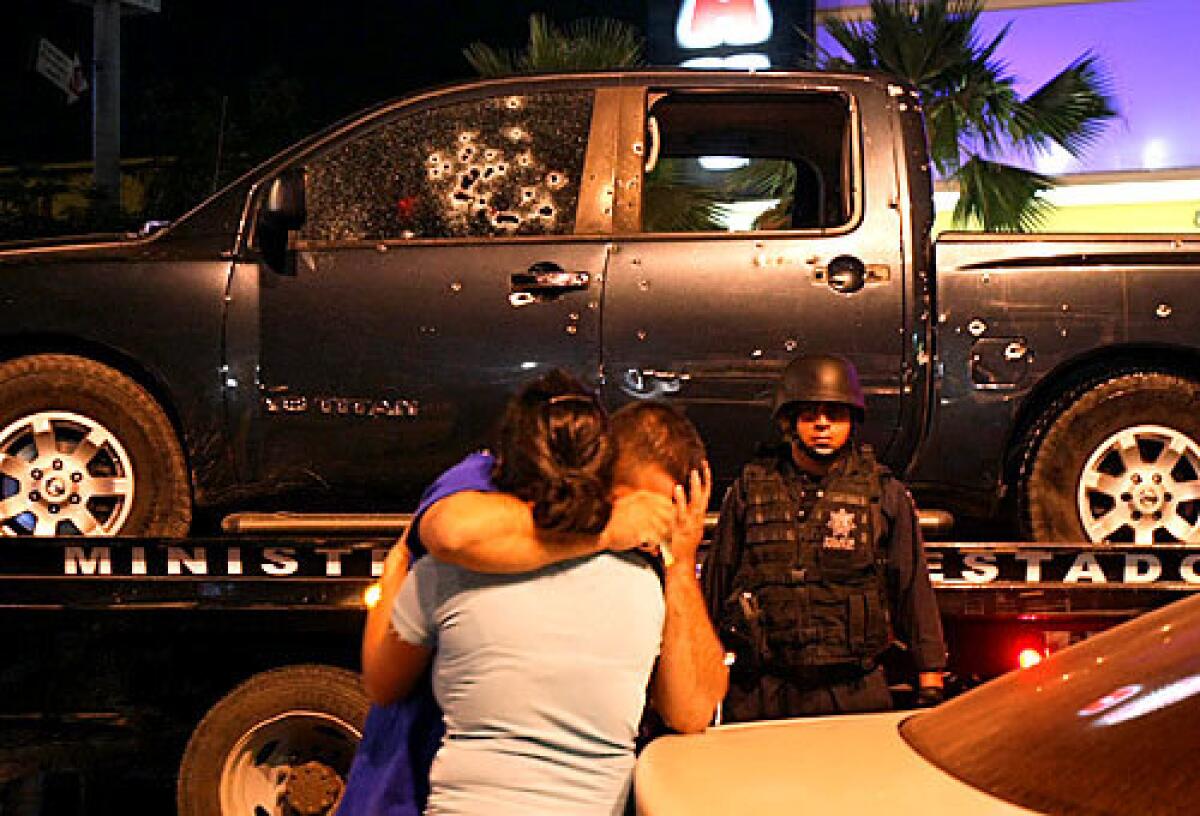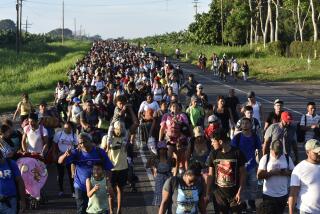Another bloody night in Sinaloa, Mexico

Reporting from Culiacan, Mexico — The fourth corpse pulled from the bullet-shattered pickup truck didn’t have the benefit of a body bag. Only the face was covered (with a useless bulletproof vest). The victim’s red shirt was even redder, soaked with blood. His bare arm hung limply from a gurney as he was lifted to a wagon from the morgue, the toes of his boots pointed skyward, at odd angles.
He was one of five federal and state police agents killed in a brazen shootout Wednesday night on the city’s prominent Emiliano Zapata Boulevard. The officers were ambushed by gunmen in three vehicles who opened fire at an intersection outside an enormous casino called Play.
The shooters escaped. Police, emergency workers and soldiers converged on the scene, as the casino’s blue and purple neon lights blinked garishly over the dead men slumped in the cab and bed of the pocked pickup. In all, 10 people were killed in Sinaloa state during a 24-hour period ended Wednesday night, a deadly slice of the burgeoning Mexican drug war. Nationwide, more than 4,000 people have been killed this year, according to Mexican media reports, many of them law enforcement agents doing battle with powerful drug gangs.
Sinaloa, a fertile state on the Pacific coast, has long been at the center of Mexico’s drug trade. It has become a hub of violence since President Felipe Calderon dispatched an army of soldiers and federal police to take on some of the biggest drug lords.
The alarming level of violence -- shootouts and kidnappings almost every day -- has sown panic and fear among a normally resilient citizenry.
“To live in Culiacan is a risk,” said Javier Valdez, a journalist and writer who hours before the killings addressed university students about the dangers of working here. “There is a psychosis -- you breathe it, live it, smell it, sweat it.”
This week, grenades were hurled at the offices of Culiacan’s largest-circulation newspaper, El Debate. Although no one was hurt, the act was widely seen as a message of intimidation.
The slain police agents (seven have been killed here in seven days) were part of a unit dedicated to cracking down on the rampant streets sales of cocaine, marijuana and other narcotics. They were ambushed a couple of blocks from their headquarters, shortly after they dropped off a suspect. Two other federal police officers with the agents were seriously injured.
After the bodies were taken away and investigators from a variety of agencies (some mistrustful of each other) did their work, a tow truck operator began the task of hauling away the agents’ vehicle, riddled by scores of high-caliber bullets, its tires flattened.
Suddenly, a white Honda Civic sped up, wheels screeching to a stop after somehow managing to penetrate police cordons. Three women and two men jumped out. They were relatives of one of the agents.
“Mi hijo! Mi hijo!” screamed one woman. “My son, my son!”
They cried and flailed their arms; one of the men, a brother perhaps, beat the hood of his car with his fists. “Oh, no, no, no,” he moaned.
“Silence!” an officer in charge commanded. “Ladies, calm yourselves.”
“You don’t understand,” one of the younger women cried back.
“Yes, ma’am, I do,” he said.
Behind them, the tow truck cranked and wheezed as it heaved the pickup onto its flatbed.
Inconsolable, the family left for the morgue, one of dozens that have sprung up here and do brisk business.
The tow truck left as well, taking away its own casualty. At the ambush site, the air smelled of spilled gasoline. Three investigators in rubber gloves picked up spent shells, scattered for many feet, filling several plastic bags.
Wilkinson is a Times staff writer.
More to Read
Sign up for Essential California
The most important California stories and recommendations in your inbox every morning.
You may occasionally receive promotional content from the Los Angeles Times.











